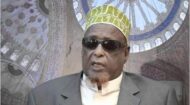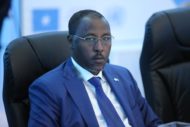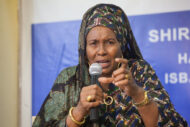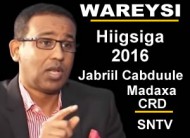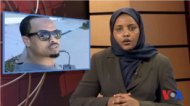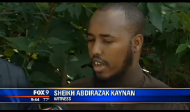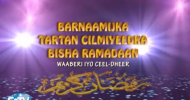Egyptian journalists tape their mouths and raise their pens during a demonstration against the draft constitution in Cairo, Egypt, Sunday, Dec. 23, 2012. Egypt`s opposition called Sunday for an investigation into allegations of vote fraud in the referendum on a deeply divisive Islamist-backed constitution after the Muslim Brotherhood, the main group backing the charter, claimed it passed with a 64 percent “yes” vote. Official results have not been released yet and are expected on Monday. (AP Photo/Amr Nabil)
Since their rise to power, the Brotherhood in Egypt has become the holy cow that many refrain from criticizing for fear of attacking Islam. This type of rule will not be accepted, for the Brotherhood is a political party with rights and obligations just as the other parties.
The protectors of the group have begun waging a relentless campaign against anyone who dares criticize the practices of the Muslim Brotherhood in Egypt, trying to make the system invincible and according the party a sanctity it does not deserve just because it labels itself Islamic with its members printing a dark spot on their foreheads that symbolizes lengthy prostration. For us, the Brotherhood is a political entity that makes good decisions and bad mistakes and therefore deserves appreciation or criticism according to its deeds.
I say to the followers of the Muslim Brotherhood in the region that we have lived through this media terrorism for years. They have fought us many times before and have not succeeded nor will they ever succeed. One day, their followers will discover what their seducers have done as they did in previous campaigns. We have also faced this media terrorism before by Hezbollah when we were accused of betrayal and being agents for the Zionists merely for discussing its actions.
Those who were fighting us unjustly yesterday turned today on Hezbollah and are using the language even we shy away from. The same thing was said to us and against us because of Iran, which claimed it was the champion of Islam and the enemy of Israel. But now they have adapted an attitude which is the completely opposite to what it was before and argue against Iran more than we do. These are the same people who were defending the regime of Bashar Assad and who believed his speeches about Arabism and Palestine and fighting the West. They closed their eyes and ignored his crimes that did not just start in March last year when the revolution of the Syrian people against him began, but even when he killed tens of Lebanese leaders, he and his colleagues were called “the objection front” and anyone who criticized him was in the Israeli camp, and in the garb of all this they were defending his crimes.
We remind those who sneer at us what they said at the time of the rise of Al-Qaeda when they defended the worst group in history, when they raved about them as if it were the resurrected Khalid bin Al-Walid Brigade. I say to all who sanctify Hassan Nasrallah and attack us because of Iran, Bin Laden and Assad: Do not rush to judge those who criticize the Muslim Brotherhood inEgypt or elsewhere. This is politics, they are politicians and most importantly, they are not a flawless group.
Unfortunately, just after a few weeks of assuming power in Egypt, the Brotherhood did not hesitate to resort to slander and dishonesty. What they said about their rival Dr. Mohamed El-Baradei is one example of their style of defamation of adversaries. They claimed he had sold Iraq, destroyed it and committed other transgressions, whereas those who follow politics closely know he is an Arab who ran international organizations with integrity and morality and who refused to implicate the international organization in the Iraqi conflict. All this was erased with a stroke of a pen and a different history of the man was written just for the sake of dominating the political arena by character assassination of their adversaries.
I realize it`s hard for some to differentiate between those who are preoccupied with Islam as a religion and politicians who raise religious slogans and that is why they use religion with opportunism. Criticizing the Muslim Brotherhood in power does not mean we are criticizing the companions of the Prophet (peace be upon him) but a normal political group like any other. When we criticize socialist movements it does not mean that we are against the values of social justice just like when we criticize the Baathists and Nationalists, it does not mean the rejection of the concept of Arab unity.
That is why we should not be influenced by campaign slogans, either religious or national. These are politicians and these are political parties. Taking a stance against a justice-driven party does not mean that we are with injustice and to stand against freedom does not mean we call for slavery. They are just names such as the names of individuals named by their owners to seduce the public.
Unfortunately, it`s the same audience who stumbles out of one intellectual blunder and falls into another, the same mistakes coming back with new names, new suits and new expressions. For this, only those who revere religious symbols such as the Brotherhood or others like them should give them the right of way, but as for us, we should not pay the slightest attention to this [email protected]


An Egyptian man reads a newspaper at a coffee shop in Cairo, Egypt, Sunday, Dec. 23, 2012. Egypt`s opposition called Sunday for an investigation into allegations of vote fraud in the referendum on a deeply divisive Islamist-backed constitution after the Muslim Brotherhood, the main group backing the charter, claimed it passed with a 64 percent “yes” vote. Official results have not been released yet and are expected on Monday. (AP Photo/Amr Nabil)
Article by Abdallah Iskandar: “Post-ReferendumEgypt”
There is no doubt that the result of the referendum on the draft Egyptian Constitution, whose last stage was concluded yesterday, will have a “yes” majority for which the Muslim Brotherhood Group aspires. We can expect a huge controversy over this result that will cast doubts about the impartiality of the polling, after casting doubts on the impartiality of the referendum sponsor, President Muhammad Mursi, who promised that he would not agree to a draft Constitution that is not met with unanimity. There will be objections related to the meaning of the referendum when nearly half the Egyptian people reject it. Also many objectors will talk about articles in the draft, which will become the Constitution, to criticize their contents, especially the articles related to public freedom, equality, and the civil nature of the state.
However, most probably President Mursi, with the Muslim Brotherhood Group and his Islamist supporters behind him, will not pay any attention to these objections, the same as they ignored all the demonstrations, sit-ins, and demands on the eve of the referendum, and between its first and second stages.
Practically, and awaiting the upcoming parliamentary elections, which will be held within three months after the referendum, as President Mursi also promised, the Consultative Council, in which the Islamists have semi-absolute control following the presidential appointments, will be turned into a legislative authority rather than the People`s Assembly. This completes the circle of control of all authorities, including the judicial authority, as the Constitution puts an end to its independence from the executive authority, and hence emerges the feature of the “rise” that the Muslim Brotherhood Group raised as a slogan for its election battles and against those opposing it.
Some Muslim Brotherhood leaders have pursued issuing reassuring statements about the state of the constitution, and the respect for the rights of the opposition. If the upcoming months will reveal the extent of the seriousness of these reassurances, the behavior of mobilization and incitement against the opposition also reveals the extent of adherence to these reassurances.
We have seen on television screens, and we have read in the media the way the imams (the partisan cadres of the Muslim Brotherhood and the other Islamist groups) deal with concepts such as the Constitution, the opposition, and the rights. Such legal and civil concepts have never been mentioned by them. They have divided the Egyptians into two worlds: the believers, who support the draft constitution and the policy of the Muslim Brotherhood, and the heretics and infidels, who oppose this policy. The journalists have recorded that most of the clashes that have taken place between Mursi`s supporters and the opposition supporters have been launched from a mosque whose preacher judges the opposition as infidels, and whose worshipers – those supporting the opposition – denounce this mixing of religion and politics, and consequently following this judgment of infidelity the problems take place.
Clear polarization has taken place in the Egyptian street between two groups. This polarization, at least in the opinion of one of these two groups, is related to belief and infidelity. This establishes a strong barrier between the sons of the one country, and deepens the political chasm from a temporary issue in political life into an essential part of the national existence.
As for the official and government level, it is clear from all the government steps taken since the election of Mursi that there is a tendency to monopoly, whether through direct pouncing on the position and posts and giving them to the Islamists, or through practices that exclude the representatives of the opposition, or pushes them to distance themselves or resign so that Islamists are appointed in their places. The experiment of the Constitution Constituent Assembly is a model of what the Egyptian opposition now calls “Muslim Brotherhood brutal spread” in authority.
Thus, the Muslim Brotherhood Group, since the election of one of its leaders as president, has started to prepare for tightening its grip on the pivots and powers of the government, and to exclude the parties, the institutions, and the figures calling for a civil government. The summit of this practice has been manifested in the draft constitution and the referendum on it, which has reached the level of popular split and civil strife that will not calm down with the announcement of the results of the referendum as long as the Egyptian civil society powers are able to object.
(Description of Source: London Al-Hayah Online in Arabic — Website of influential Saudi-owned London pan-Arab daily. URL: //www.daralhayat.com)
© Compiled and distributed by NTIS, US Dept. of Commerce. All rights reserved.

 All Posts
All Posts


